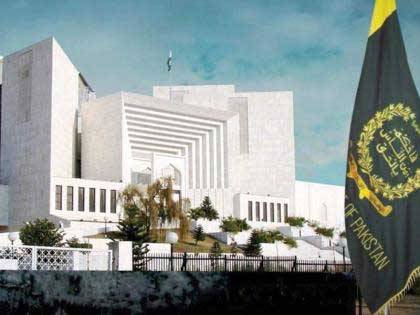ISLAMABAD - The Supreme Court of Pakistan Wednesday disposed of a suo motu notice on voluntary return under Section 25(a) in the National Accountability Bureau (NAB) cases.
A three-member bench of the apex court headed by Chief Justice Umar Ata Bandial and comprising Justice Sayyed Mazahar Ali Akbar Naqvi and Justice Ayesha Malik conducted hearing of the cancellation of bails of Muhammad Safdar and Muhammad Ejaz and the suo motu notice, which the former chief justice Anwar Zahir Jamali had taken in 2016 to examine the vires of section 25(a) of National Accountability Ordinance (NAO), 1999.
Justice Jamali had taken suo motu on the basis of trial by a two-member bench in civil appeal no 82-K of 2015 had passed an order that the vires of Section 25(a) of NAO, 1999, authorising the NAB chairman to accept the offer by a person of voluntary return of money, illegally earned by him, needed to be examined at the touchstone of the Constitution. According to the NAB report, which it had submitted in September 2016, before the apex court, 1,584 civil servants entered into voluntary return and deposited Rs2022 million. Out of that 165 servants were from the federal and 1,419 were the employees of all the provincial governments. During the proceeding, additional attorney general informed that Section 25(a) is an offence in the National Accountability (Second Amendment) Bill, 2022. He said whatever the sentence is for plea bargain would also apply to voluntary return, adding that after the voluntary return the accused would be banned to hold government position for 10 years.
NAB prosecutor requested that the cases of Muhammad Safdar and Muhammad Ejaz be heard after the judgment on NAB Amendments case. The chief justice said all the amendments have not been challenged. The chief justice noted that lacuna in the law in this regard has been removed, adding that this is a good amendment.
The two-member bench order ruled; “This provision prima facie is in conflict with the provision of Constitution, where such power can only be exercised by a judicial forum as after payment of voluntary return, the person goes scot-free without any stigma on his career and can contest the elections and or can continue in public office, as the section does not provide any disqualification, as against the disqualification provided under Section 25(b) of the NAB Ordinance.”
“This frequent exercise of powers of ‘voluntary return’ by the NAB chairman has in fact multiplied corruption on the one side and defeated the object of the NAB Ordinance on the other side,” the order said. The court observed that the provisions of Section 25(a) were not meant to allow corrupt public servants to get a clean chit from NAB authorities by paying a portion of the embezzled money.
The court further observed, “What is more shocking for us is that no departmental proceedings are initiated against any of such accused, who entered into voluntary return.”






